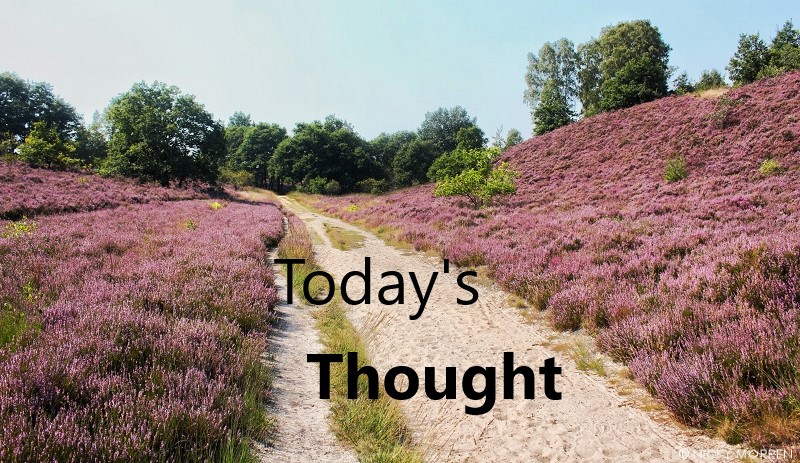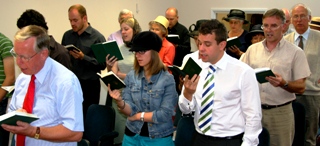Geopolitical crises like the Asian meltdown and 9/11 became defined risk in the public consciousness (being ‘staged in the mass media’) and have repopularised
scenario planning and threat assessments as pragmatic futures methodologies.
International risk management has become a lucrative niche for management
consultancies and futures practitioners and flourished because ‘risk presupposes decision’ (Beck, 1999, 4).
We could focus primarily on the negative and get bounded by the idea that there are Limits to Growth, giving the danger to get caught in the ‘risk trap’ (Beck, 1999, 141).
We as individuals may not stay at the side line and have to act. Knowing that there is the concept of risk we also have to think about securing. Though we shall be confronted by uncertainty of knowledge and the certainty we can make mistakes and errors we should be aware that there is a big difference between inability to know and unwillingness to know as well as unwillingness to change or to do something. We cannot be prophets neither look into the future telling glassball. But we can have some idea of the impact of certain actions.
We also do not to accept that disasters are just a part of life to which we cannot change anything. Premier Iemma said in 2007: “the state government can’t be expected to foot the bill for every act of god”. But it is not God who brings disasters over people. It are people themselves who create the possibilities that disasters can happen.
In ‘The Risk Society: social democracy in an uncertain world‘, CPD fellow John Quiggin examines the role of government as the ultimate risk manager. He argues that risk will be the defining concept of the 21st century, the way that globalisation was for the 1990s. The risks and uncertainties shared by all require a shared response, argues Quiggin.
Men has become confronted with increased productivity requirements, flexibilities requirements, which all that set the family life and the life quality under pressure. The society accelerates continually. Technological developments follow each other in high tempo. At the same time not everybody has the same possibilities to cope with this acceleration. Therefore the environment or people around do have to take care of them. Because of the pressure of the exploding industrialisation and technological progress we see that with many men the time pressure always presses more heavier on the life quality. Society is starting to run in overdrive and if we are not careful it shall have its ‘heart-attack’.
Then we have the migration-risks in our cities. Before never were our European cities so coloured, various and cosmopolitan as today the day. The globalization will go together with large migration-streams . They lead per definition till jumble social changes and until conflicts. As well for the one who does the migration and is found in someone else society and culture, are there risks as for the society, which receives the migrant .
According to Dirk Geldof sits the fundamental tension there that we that we with 6.5 billions men ought to be allies. Also he, though he says it not so, referrers to the selfishness of our society by which each must only see for its own nest. If we do want to protect the community we should come again to a change of mentality were everybody becomes more concerned of the other. This mentality change has to happen first in the education of the kids. they do have to learn to take care of each other and of their environment. Keeping everything tidy around them is an important factor.
Also according to Geldof we have a common interest, but at the same time we sit with the unequal distribution of wealth and risks and thus per definition with conflicts. Therefore also a question of ecological justice is the whole methodology of the ecological foot print per definition. It goes over interests conflicts. That makes the discussion over the posts-Kyoto-agreements also so difficult. The big danger is, that the fight over the question who is responsible and who must do the most efforts leads to it that we are much too late and do much too little efforts. A large problem by many societies is that they have no long term-perspectives in their economy, in their politics, nor in their society. Only by trying to calculate all the risks and look for preventive measures they could come up to securing the risks.
The short term, the profit and maximalisation thinking must be broken and it is clear that we must learn go cope and accept the borders, which earn respect, on the first place the borders of our planet, on the territory of the human basis, so that we re-explore and rediscover the future as factor to hold in account.
The problem for securing risks is that most societies “make up their own “minds”” in accordance with their own political prejudices. On the other hand we often are also to afraid of confronting the sceptics and political standards often prohibit a good sensitive dialogue. Concerned citizens mainly would place social values over their economic interest but understandably they would not like their budget to much assailed. We do not want our living-quality being eroded.
The civilised world over-consuming society faces an energy problem. If we don’t act very soon on the huge task of restructuring demanded by the crisis of climate change the stress placed on all parts of our economy by the oil price rises generated out of peak oil will severely constrain our ability to take action on climate change. The danger is that only when the present flush of fossil fuels rushing through the economy starts to decline that people are going to pull the alarm bell.
Though people do have also to be aware of the dangers of airconditioning, internet, mobile connection but also of those things which seem to bring a solution to the energy crisis: windmills, photovoltaic cells, pellets, etc..We may perhaps be very delighted that so many people are placing solar cells on their roof. The energy generated from these solar modules, referred to as solar power, can look a good solution, but do we think enough about the anti-reflective layer, crystalline silicon, monocrystalline silicon, polycrystalline silicon, amorphous silicon, nanocrystals, thin-film solar cells, cadmium telluride, and copper indium selenide/sulfide. What are we going to do when such solar cells are damaged or at their end of life? Many solar power advocates predict that grid parity will occur in the near future and that solar would possibly be able to cost-effectively compete with fossil fuels “within a matter of months,” due to falling solar modular prices. (Grid parity also applies to wind power where it varies according to wind quality and existing distribution infrastructure. ExxonMobil predicts wind power real cost will approach parity with natural gas and coal without carbon sequestration and be cheaper than natural gas and coal with carbon sequestration by 2025. But we have to be careful not to place the windmill in the flightpaths of birds.) Due to the growing demand for renewable energy sources, the manufacture of solar cells and photovoltaic arrays has advanced dramatically in recent years. It may become cheaper because more people want to use it and more have to be produced, but at which cost for our environment?
Net metering and financial incentives, such as preferential feed-in tariffs for solar-generated electricity, have supported solar PV installations in many countries but as in Belgium those who have no house of their own or have not enough money to place solar cells on their roof are unrighteous obligated to pay for those who got subsidised.
Economy shall be forced to change with the coming energy crisis. Failings of political and regulatory distortions of the market bring house- and household-prices in the wrong direction. Free market can be nice but their has to be a certain state control looking over the price system and over the quality of making, presenting, delivering and handling the products and after-sales. But there to we have to be careful how we want to protect one or the other. For example with an aging population creating problems for budgets and public policy, artificially inflating the home values of retirees could serve as a kind of ‘hidden tax’ on younger workers to prop up the asset base of retirees. And distorting the market by encouraging more investment in increasing the value of homes at the expense of investing elsewhere in the economy could bring our social wealth in discordance.
Trying to secure the risks governments must be careful not to destroy the personal freedom. Personal independence of individuals is important and are the thriving force for renewal and continuation. A person who has to give all his little spare cash either to banks or to corporate enterprises or to governments has no ‘freedom’ – he or she is a wage-debt-tax slave. today we already have to see that lots of workers are already enslaved by their work. The boss or firm has become the modern slave-driver, instead of a co-operate and provider of a good life.
Today we can find several companies who provide a wide range of specialised and individually tailored instruments for addressing the risks to which entities in an open market economy are exposed. Issues of corporate governance and duty of care have increased the pressure on the business at home and at the international plants. There is also tan increased pressure which add to the difficulties of working in hostile and difficult regions of the world which demands a form of protection. With manned guarding certain risks are already secured (in a certain way). Those guards and deskofficers are often also used to protect the established system. Reception staff often have to bear the brunt of attacks from single-issue protest groups and thus need specific training and support to ensure they are able to manage and cope effectively. They can play the buffer and are not as unimportant as some people think.
Concerns are most interested to secure themselves. They have reason to best protect themselves from the next round of risks, especially as the costs of energy and of waste disposal is rising, plus they have to face industrial espionage, cloud computing, mobile, and social media and networking activities which increase. They have to find ways to come to an effective and pervasive architecting for security.
Legal and regulatory bodies have to step in and safeguarding organisations have to cross borders. The politicians have to think ‘great’ and can not stay restricted to their own little country and even not only to a European Union or a United States of America or a Common Wealth Countries, they all have to start thinking ‘Global’
Over the last decade, the United Nations (“U.N.”) has taken a central role in the international community’s response to the consequences of disasters and armed conflicts. Paradoxically, international agencies, both of the U.N. and non-U.N. variety, have been slow to respond to the ongoing insecurity and have yet to establish a robust security management system. Reconstruction and development agencies, under pressure by Western donors, are often compelled to increase their presence in hazardous situations where they are clearly not prepared
to cope with prevailing insecurity. Over the years, the U.N. has sought to fulfil its own moral vision by attempting to be a beneficent universal institution which promotes human rights and protects vulnerable populations from humanitarian catastrophes. (See U.N. Charter pmbl.)
The organization has also embraced transformative agendas, helping governments reshape the social, political, and economic structures of countries in conflict. (See, e.g., The Secretary-General, Prevention of Armed Conflict, delivered to the Security Council and the General Assembly, U.N. Doc. S/2001/574, A/55/985 (June 7, 2001)
The mixing of life-saving activities with development and reconstruction programs may have blinded some agencies to new vulnerabilities brought on by the political motives of their sponsors and financial backers who often tie their support for assistance to political reforms, good governance, or political alignment.
Next to protecting the corebusiness we shall have to combat the spread of weapons of mass destruction by training the next generation of nonproliferation specialists and disseminating timely information and analysis.
Always do we have to take the different risks in consideration. They must be weighed against the overwhelming benefits they can offer. For example radioactive sources which are used worldwide and provide valuable services to humanity for medical, industrial, agricultural, and research purposes. While non-radioactive alternatives can reduce some of this usage and should be pursued, many applications will continue to require radioactive sources. Though controls have improved, thousands of sources worldwide continue to be lost, abandoned, or stolen on an annual basis. In addition, tens of thousands of sources remain orphaned due to insufficient resources to find and secure them and, thereby, pose safety and security threats. “‘Safety’ means measures intended to minimize the likelihood of accidents with radiation sources and, should such an accident occur, to mitigate its consequences,” and “‘security’ means measures to prevent unauthorized access to, and loss, theft and unauthorized transfer of, radioactive sources, and measures to protect facilities in which adioactive sources are managed.” (Surveying the Security Risks) Politicians should take care that nuclear power can not become a danger to the inhabitants. Having built nuclear power-stations without enough safety measures, on an earthquake zone is intolerable. The responsible persons should also fully understand the potential security vulnerabilities requiring knowing the lifecycle of radioactive sources and taking those in account for the risk analysation. Every stage in the life of a source deserves appropriate security measures.
The research programme ‘Constructing human security in a globalising world’ investigates what security means to people and how they themselves try to realize security through cultural, symbolic and religious processes of sense-making, meaning and identity formation. Though after the 2nd World War people were very aware of the necessity to protect themselves for all sorts of dangers, nuclear, chemical, spionage a.o., not much seem to have happened to concretely come to a honest protection of nature and its habitants. Human Security was defined as ‘freedom from want and freedom from fear’ in the 1994 UN Development Programme. To come to securing risks we do have to go further then round-table conferences. It goes beyond peace-keeping operations, post-conflict reconstruction and military culture, and includes other aspects of anthropology (like religion, ethnicity, transnationalism, gender, social and political transformations, natural resource management, and development).
As it has been said ‘it is not five to twelve’ it is already ‘five past twelve’. Action has to be taken worldwide now.
The Risk Society: social democracy in an uncertain world’ by John Quiggin (pdf)
Niet meer maar beter. Over zelfbeperking in de risicomaatschappij (1999) by Dirk Geldof
Mark Z. Jacobson (2009). Review of Solutions to Global Warming, Air Pollution, and Energy Security
A new approach to Human Security
About the extra charge for those who can not place solar cells in Belgium: in Dutch: Energie met vergiftigd geschenk
The Book “not more but better” in Dutch: Niet meer maar beter by Dirk Geldof
+++
Related articles
- Glenn Beck Vs. The Mob – HUMAN EVENTS | Ann Coulter (jamespatrick1.wordpress.com)
Beck and his family would have been fine at an outdoor rap concert. They would have been fine at a sporting event. They would have been fine at any paid event, mostly because people who work for the government and live in rent-controlled apartments would be too cheap to attend.Only a sad leftist with a crappy job could be so brimming with self-righteousness to harangue a complete stranger in public.People incapable of conforming to the demands of civilized society are frightening precisely because you never know what else such individuals are capable of. Sometimes — a lot more often than you’ve heard about — liberals do engage in physical violence against conservatives … and then bravely run away.That’s why not one person stepped up to aid Beck and his family as they were being catcalled and having wine dumped on them at a nice outdoor gathering. - ASSUMPTIONS ABOUT Uncertain Effects and Risk (obxcommonground.org)
It is important that analyses address risk and uncertainty. Studies should admit the possibility that a desired or intended outcome does not occur and include those prospects in their aggregate forecasts of policy impacts. - Dot Earth: When Risk Misperceptions Create Risks (dotearth.blogs.nytimes.com)
By 2050 or so, the world population is expected to reach nine billion, essentially adding two Chinas to the number of people alive today. Those billions will be seeking food, water and other resources on a planet where, scientists say, humans are already shaping climate and the web of life.The Perception Gap.
How does society deal with the dangers of The Perception Gap when, no matter how well informed people are nor how well-educated, their subjective interpretations of information still don’t match the evidence — in ways that create risk, for themselves, or for society? - … how beliefs and feelings trump facts … “What’s Missing From Our Cognitive Toolkit?”
- Beauty: part 2, the decent into risk (charlesbonaventure.wordpress.com)
Risk is profoundly important to our reality as humans. Societies are just grand constructs to enshrine the instinct of self-preservation. This self-preservation makes us enemies of those things that would change our subjective state from a higher to a lower good. This change of state is what we perceive as “harm”. Risk is simply the possibility of this harm.
Our daily interaction with possibility is not a particularly fruitful source of metaphysical evaluation. We commonly use previous experience to constrain possibility. This is a misappropriation of identity since possibility is by definition unconstrained. Any attempt to assign qualities to possibility is destined to fail. Although predicate knowledge is sometimes a good approximation to possibility, this knowledge is not ontological identity.
If expected risk causes us anxiety, what happens if we take the opposite response to the possibility of harm? What if we instead assume that a future event will not occur? - Self inflicted misery #2 Weakness of human race (christadelphians.wordpress.com)

































 Biblestudents – Bijbelstudenten
Biblestudents – Bijbelstudenten 0 + Bloggers for Peace
0 + Bloggers for Peace Free Christadelphian Ecclesia
Free Christadelphian Ecclesia Hoop tot Leven – Redding in Christus
Hoop tot Leven – Redding in Christus Vrije Broeders in Christus (Free Flemish Christadelphians on Wordpress)
Vrije Broeders in Christus (Free Flemish Christadelphians on Wordpress)















Pingback: Bad things no punishment from God « Christadelphian Ecclesia
Pingback: Self inflicted misery and way out « Christadelphian Ecclesia
Pingback: Self inflicted misery #1 The root by man « Christadelphian Ecclesia
Pingback: Self inflicted misery #9 Subject to worldly things « Christadelphian Ecclesia
Pingback: Bleak forecasts for children in the UK | Marcus' s Space
Pingback: Droevig vooruitzicht voor jonge kinderen | Marcus' s Space
Pingback: De nacht is ver gevorderd 2 Studie 1 Zijn het de laatste dagen? 1 Intro | Broeders in Christus
Pingback: Melting icebergs sign for the world | From guestwriters
Pingback: Less… is still enough | From guestwriters
Pingback: Shaped by years of unprecedented outreach and public engagement | Marcus Ampe's Space
Pingback: Back from gone #2 Aim of godly people | Belgian Biblestudents - Belgische Bijbelstudenten
Pingback: Back from gone #4 Your inner feelings and actions | Belgian Biblestudents - Belgische Bijbelstudenten
Pingback: One can buy a lot in the supermarket, but not hope | From guestwriters
Pingback: World leaders gathering in the Scottish city of Glasgow for the UN climate conference – Some View on the World
Pingback: My giraffe self – Worldviewer